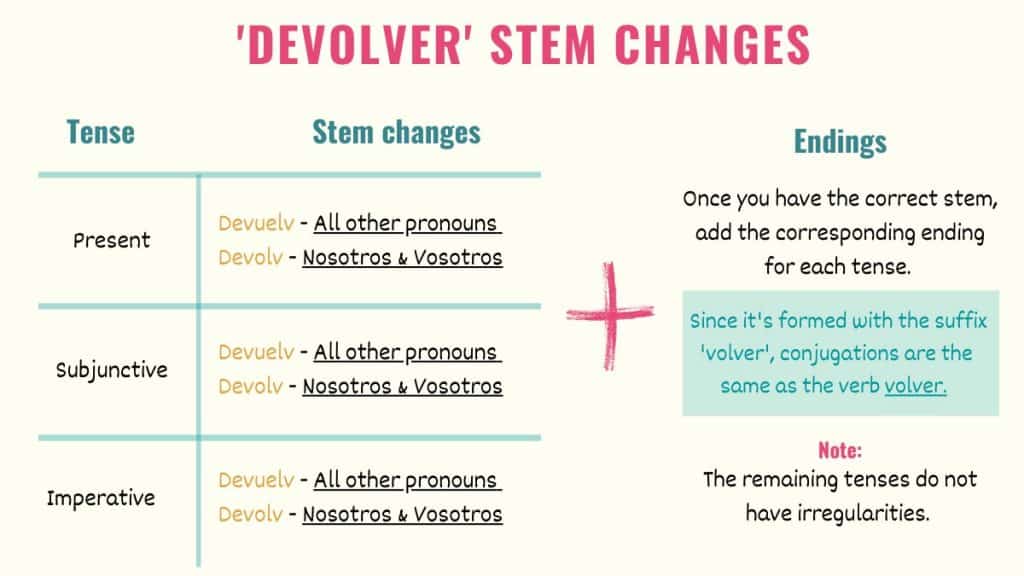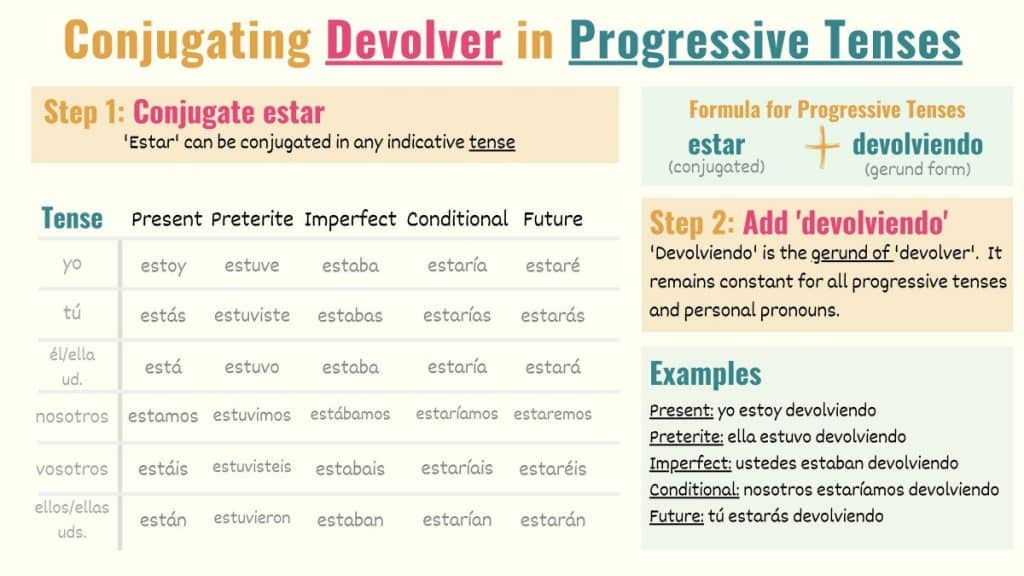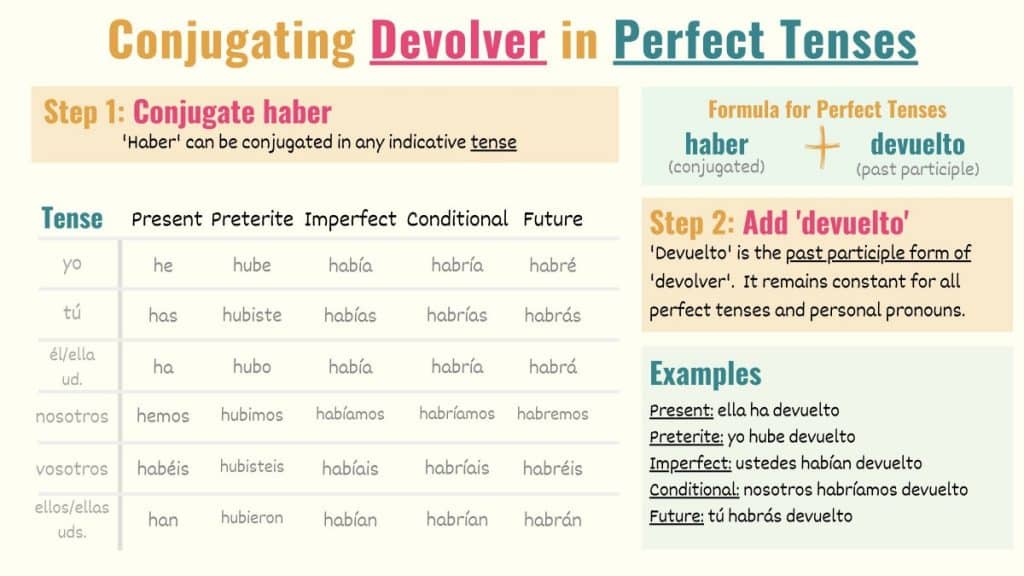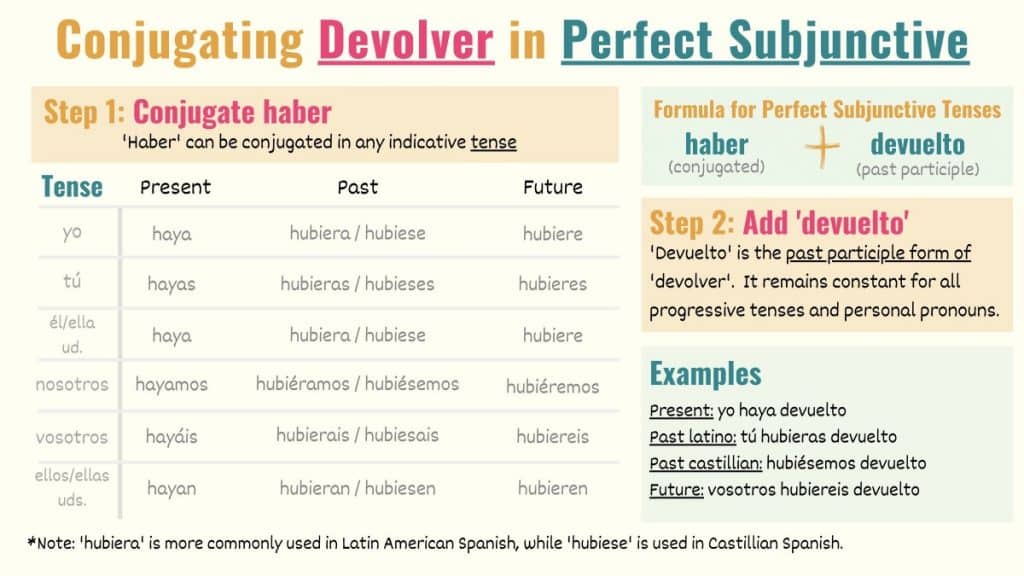In this short guide, we will cover the following topics for ‘devolver’ in Spanish:
- What does ‘Devolver’ mean?
- ‘Devolver’ Conjugations
- How to Use ‘Devolver’ in Spanish
- Expressions & Idioms with ‘Devolver’
- Synonyms of ‘Devolver’ in Spanish
What does ‘Devolver’ mean?
In Spanish, ‘devolver’ means ‘to return’, ‘to give back’, ‘to take back’ or ‘to send back’. As a result, it is frequently used to talk about returning borrowed objects, items from a shop, refunds and favors.
‘Devolver’ Conjugations
‘Devolver’ is an irregular verb. Therefore, its stem will change from ‘devolv’ to ‘devuelv’ for some of the tenses and subjects.

Take note: As ‘devolver’ is formed with the prefix ‘de’ and the suffix ‘volver’, the conjugations for ‘devolver’ will be the same as the verb ‘volver’.
Indicative
Present tense conjugation
In the present tense ‘devolver’ has some irregularities. Notice that ‘nosotros’ and ‘vosotros’ will use the stem ‘devolv’, while the rest of the subjects use ‘devuelv’.
| Person | Conjugation | Translation |
|---|---|---|
| Yo | Devuelvo | I return |
| Tú | Devuelves | You return |
| Él / Ella / Usted | Devuelve | He/She returns |
| Nosotros | Devolvemos | We return |
| Vosotros | Devolvéis | You return |
| Ustedes / Ellos / Ellas | Devuelven | They/You return |
Preterite tense conjugation
To conjugate to the preterite tense, you’ll need to add the proper endings to the regular stem ‘devolv’.
| Person | Conjugation | Translation |
|---|---|---|
| Yo | Devolví | I returned |
| Tú | Devolviste | You returned |
| Él / Ella / Usted | Devolvió | He/She returned |
| Nosotros | Devolvimos | We returned |
| Vosotros | Devolvisteis | You returned |
| Ustedes / Ellos / Ellas | Devolvieron | They/You returned |
Imperfect tense conjugation
| Person | Conjugation | Translation |
|---|---|---|
| Yo | Devolvía | I returned |
| Tú | Devolvías | You returned |
| Él / Ella / Usted | Devolvía | He/She returned |
| Nosotros | Devolvíamos | We returned |
| Vosotros | Devolvíais | You returned |
| Ustedes / Ellos / Ellas | Devolvían | They/You returned |
Future tense conjugation
To conjugate to the future tense, you’ll need to add the future endings to the verb in its infinitive form.
| Person | Conjugation | Translation |
|---|---|---|
| Yo | Devolveré | I will return |
| Tú | Devolverás | You will return |
| Él / Ella / Usted | Devolverá | He/She will return |
| Nosotros | Devolveremos | We will return |
| Vosotros | Devolveréis | You will return |
| Ustedes / Ellos / Ellas | Devolverán | They/You will return |
Conditional tense conjugation
The conditional tense uses the infinitive form of the verb (‘devolver’) followed by the conditional endings.
| Person | Conjugation | Translation |
|---|---|---|
| Yo | Devolvería | I would return |
| Tú | Devolverías | You would return |
| Él / Ella / Usted | Devolvería | He/She would return |
| Nosotros | Devolveríamos | We would return |
| Vosotros | Devolveríais | You would return |
| Ustedes / Ellos / Ellas | Devolverían | They/You would return |
Progressive Tenses

Te estoy devolviendo el favor.
I’m returning the favor.
Muchos clientes estuvieron devolviendo los products.
Many customers were returning the products.
Perfect Tenses

No he devuelto el libro a la biblioteca.
I have not returned the book to the library.
Creí que ya te había devuelto el vestido.
I thought I had already given you the dress back.
Devolver Subjunctive Conjugations
Present subjunctive conjugation
When conjugating to the present subjunctive, you’ll need to use the irregular stem ‘devuelv’ for all subjects with the exception of ‘nosotros’ and ‘vosotros’. For those subjects, you’ll use ‘devolv’.
| Person | Conjugation | Translation |
|---|---|---|
| Yo | Devuelva | To return |
| Tú | Devuelvas | To return |
| Él / Ella / Usted | Devuelva | To return |
| Nosotros | Devolvamos | To return |
| Vosotros | Devolváis | To return |
| Ustedes / Ellos / Ellas | Devuelvan | To return |
Imperfect subjunctive conjugations
| Person | Conjugation | Translation |
|---|---|---|
| Yo | Devolviera / Devolviese | I returned |
| Tú | Devolvieras / Devolvieses | You returned |
| Él / Ella / Usted | Devolviera / Devolviese | He/She returned |
| Nosotros | Devolviéramos / Devolviésemos | We returned |
| Vosotros | Devolvierais / Devolvieseis | You returned |
| Ustedes / Ellos / Ellas | Devolvieran / Devolviesen | They/You returned |
Perfect subjunctive

¿Crees que Luis haya devuelto los boletos?
Do you think Luis returned the tickets?
Hubieras devuelto los zapatos si no te quedaban.
You should have returned the shoes if they didn’t fit.
Imperative
Imperative conjugation
While ‘tú’ and ‘ustedes’ use the stem ‘devuelv’, the rest of the subjects use the regular stem ‘devolv’. Keep in mind that to conjugate to the negative imperative you’ll need to use the present subjunctive conjugations.
| Person | Conjugation | Translation |
|---|---|---|
| Tú | Devuelve | Return |
| Nosotros | Devolvamos | Let’s return |
| Vosotros | Devolved | Return |
| Ustedes | Devuelvan | Return |
[‘Devolver’ imperative] + [complement]
Devuélveme mi dinero.
Give me my money back.
Chistian, devuelve ese libro a su lugar.
Christian, put that book back in its place.
No + [‘devolver’ in present subjunctive] + [noun]
No devuelvas ese abrigo.
Don’t return that coat.
How to Use ‘Devolver’ in Spanish with Examples
In Spanish, ‘devolver’ is mainly used to talk about returning things. In the section below, I’ll show you some examples of several contexts in which you can apply this verb.
Expressing that someone is returning something
In Spanish, we mainly use ‘devolver’ when describing that person is returning something. So, ‘devolver’ means ‘to return’, ‘to take back’, ‘to send back’ or ‘to give back’. Although this verb is commonly used to talk about returning material things, it can also be used to refer to immaterial things like favors or greetings, among others.
[‘Devolver’ conjugated] + [article] + [noun]
¿Alicia devolvió el pantalón que le quedó grande?
Did Alicia return the pair of jeans that were too big for her?
Devolví los zapatos porque no me gustaron.
I returned the shoes because I didn’t like them.
Mariana devolverá la cafetera a la tienda.
Mariana will send the coffee maker back to the store.
Por favor, devuelve ese sueter, ¡está horrible!
Please, take that sweater back to the store, it’s hideous!
As sentences that contain ‘devolver’ usually involve more than one person, you’ll frequently see this verb accompanied by indirect pronouns.
[Indirect pronoun] + [‘devolver’ conjugated] + [determiner] + [noun]
Algún día te devolveré el favor.
Someday I’ll return (you) the favor.
Antonio nunca me devolvió el lápiz que le presté.
Antonio never returned the pencil I lent him.
¿Ya le devolviste la computadora a tu hermana?
Did you already give the computer back to your sister?
La empresa les devolvería el dinero si tuvieran el ticket de compra.
The company would refund you the money if you had the purchase receipt.
Take Note: In very formal contexts, ‘devolver’ can also be used as a synonym of ‘to vomit’ or ‘to throw up’. Although in this context it’s more common to use vomitar, you could also find some people that use ‘devolver’ with this meaning.
Devolver Expressions & Idioms
Devolver bien por mal is used to describe a person that keeps a kind attitude towards someone that hurt or mistreated them. It translates as ‘to return good for evil’.
Synonyms of ‘Devolver’ in Spanish
Regresar can also be translated as ‘to return’ and can be used in the same contexts shown in the examples above.
Volver means ‘to come back’, ‘to return’, ‘to go back’ or ‘again’. Depending on how it is used, this verb expresses repetition or that someone is returning to a certain place.
Reembolsar is used to talk specifically about returning money and is translated as ‘to refund’.



